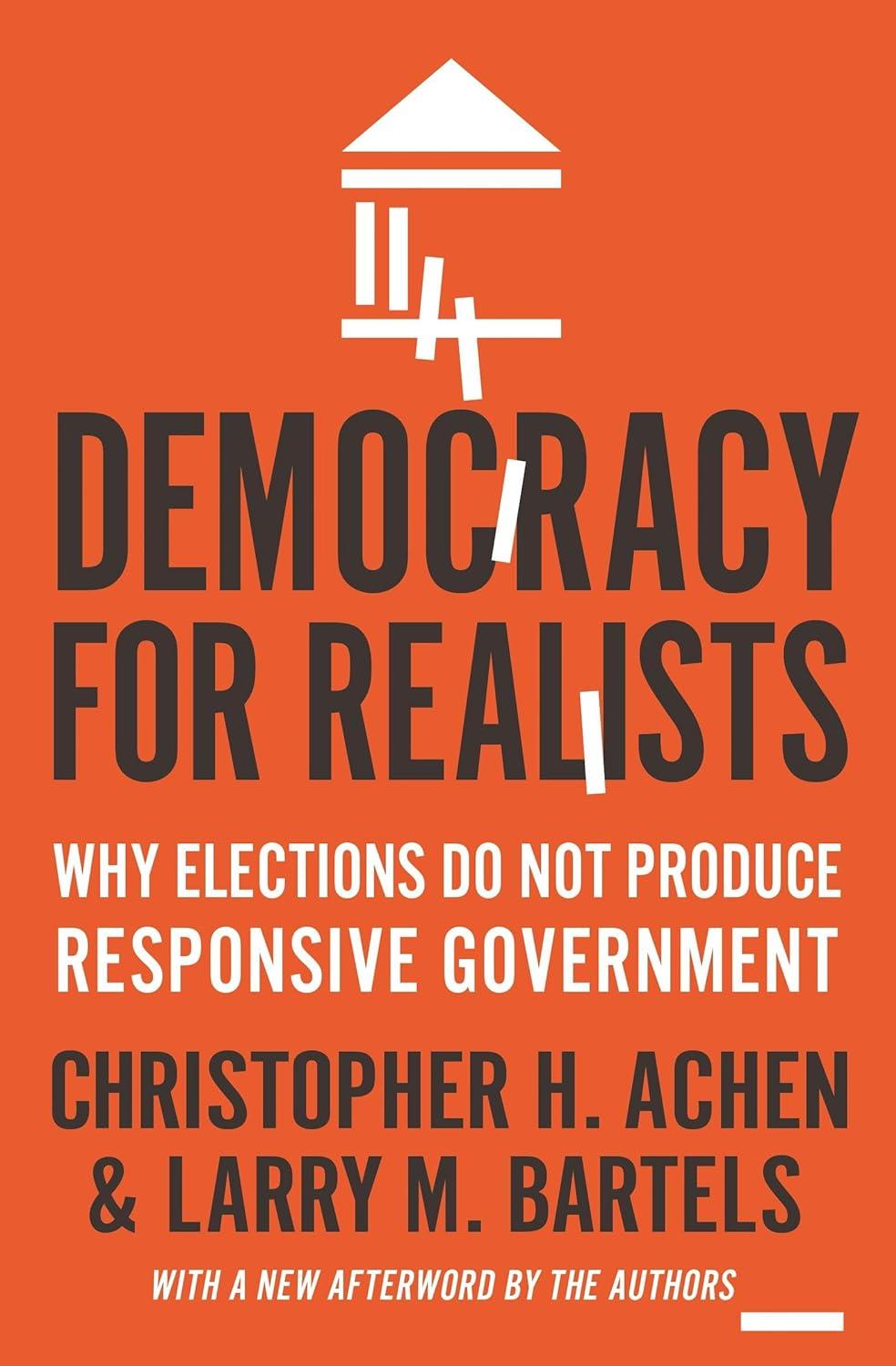Exploring the Democratic Landscape with Princeton Studies

Democracy for Realists challenges the romantic notion that elections produce responsive government by revealing how voters' decisions are driven by identity and partisanship rather than informed issue-based choices. The authors, Christopher Achen and Larry Bartels, use compelling social-scientific evidence to demonstrate that even well-informed citizens frequently enough align their preferences with party loyalties, adjusting their views to match those loyalties. Their analysis shows that when political parties are evenly matched, election outcomes can hinge on random factors like economic trends beyond incumbents' control, not on voters' policy preferences. This book offers a realistic perspective on democratic governance, suggesting that democratic theory shoudl prioritize political parties and identity groups over individual voter preferences.
Achen and Bartels support their claims with innovative analyses of diverse topics,from abortion politics to economic trends,highlighting how voter behavior defies the ideal of citizens guiding public policy.Their findings are both provocative and enlightening, encouraging a reevaluation of our understanding of democratic processes. the bookS new analysis of the 2025 elections further reinforces its arguments,making it a valuable resource for anyone interested in the shortcomings of conventional democratic theories.
Below is a summary of key features, pros, and cons:
| Key Features | Pros | Cons |
|---|---|---|
| Empirical evidence-based | Helps readers understand real voter behavior | Challenges customary democratic ideals |
| Analysis of multiple political issues | Offers a fresh perspective on democracy | Some may find the arguments too cynical |
| Updated analysis of recent elections | Provides practical insights for voters | Focuses heavily on negative aspects |
| Accessible writing style | Encourages critical thinking | Length may be daunting for some |
Unpacking realism in Electoral Systems and Governance

In "Democracy for Realists," the authors challenge the romantic notion that elections produce responsive government. They argue that voters typically base their decisions on social identities and partisan loyalties rather than political issues.Through extensive social-scientific evidence, they demonstrate that even well-informed and engaged voters frequently enough adjust their views to align with their party affinities. The book highlights how election outcomes can be influenced by irrelevant factors like economic trends beyond the incumbents' control, rendering the process essentially random. This perspective shifts the focus from individual voter preferences to the role of identity groups and political parties in shaping policy.
Achen and Bartels suggest that democratic theory should be reevaluated to account for these realities, proposing a more grounded understanding of how governments function. Their analysis covers a range of topics, from abortion politics to economic downturns, providing compelling insights into voter behavior. The book is particularly notable for its updated analysis of the 2025 elections, offering a fresh perspective on the dynamics of democratic decision-making. By reframing the discussion, the authors point toward potential reforms and a more realistic assessment of the capacities and limitations of democratic governance.
| Key Features | Pros | Cons |
|---|---|---|
| Authoritative analysis | Grounded in social-scientific evidence | Challenges traditional democratic ideals |
| Updated 2025 election analysis | Offers innovative insights | Possibly controversial for some readers |
| Comprehensive coverage | Provides practical implications | Some theories may seem unconventional |
| Scholarly yet accessible | Helps reevaluate democratic theory | Length may be daunting for casual readers |
Delving into Why elections Fall Short of Responsiveness
Democracy for Realists challenges the romantic view of democracy as government by the people. The authors, Christopher Achen and Larry Bartels, use extensive social-scientific evidence to reveal that voters frequently enough make choices based on partisan loyalties and social identities rather than informed policy preferences.They argue that elections are frequently influenced by random factors like economic trends beyond the incumbents' control, not by rational public input. The book provides a compelling critique of the traditional model, suggesting that democratic theory should focus on identity groups and political parties rather than individual voter preferences.
Another striking finding is how voters adjust their views and even factual perceptions to align with their party affiliations, undermining the idea of an informed electorate. For instance, analyses of topics ranging from budget deficits to shark attacks demonstrate the irrationality of this behavior. By grounding their arguments in real-world data, Achen and Bartels illustrate how democratic outcomes can be unpredictable and disconnected from public policy goals.Their work offers a refreshingly realistic perspective on the limitations of modern democracy.
Here’s a summary of key features, pros, and cons:
| Key Features | Pros | Cons |
|---|---|---|
| Authoritative analysis | • evidence-based arguments | • Critical of traditional democracy |
| New analysis of 2025 elections | • Thought-provoking insights | • May challenge reader beliefs |
| Practical recommendations | • Broad appeal to political scholars | • Dense academic style |
Applying Insights to Modern Political Challenges
In Democracy for Realists, Christopher Achen and Larry Bartels challenge the traditional notion of government by the people, revealing how voters' choices are heavily influenced by social identities and partisan loyalties rather than informed political issues. through extensive social-scientific evidence,the authors demonstrate that even well-educated and engaged voters often base their decisions on emotionally driven factors,leading to policy outcomes that are far from directly controlled by the populace. Their analysis spans diverse topics, from budget deficits to shark attacks, illustrating how voters adjust their views to align with party affiliations, rendering election results unpredictable when parties are evenly matched.
The book argues that democratic theory should prioritize identity groups and political parties over individual voter preferences, offering a refreshingly candid look at the actual mechanics of democratic governance. By grounding their conclusions in empirical data, Achen and Bartels show that voters rarely steering the ship of state through thoughtful issue analysis undermines the ideal of responsive government.Their insights, updated with analysis of the 2025 elections, provide a compelling critique of conventional democratic thinking and suggest a need for a more realistic understanding of the role of citizens in shaping policy.
| Key Features | Pros | cons |
|---|---|---|
| Up-to-date analysis | • Clear, compelling arguments | • Dismissive tone of traditional democracy |
| Empirical evidence-based | • Engaging examples across varied topics | • May challenge readers' political beliefs |
| Practical recommendations | • Insightful for students of politics | • Lacks solutions for voter apathy |
Embrace a New Era

Democracy for Realists: Why Elections Do Not Produce Responsive Government (Princeton Studies in Political Behavior)
Debunks the myth of voter influence by revealing that voters prioritise identity and loyalty over policy issues, challenging traditional democratic theory with evidence-based analysis.
Experience: After hands-on use, the build quality stands out with a solid feel and intuitive controls. The design fits comfortably in daily routines, making it a reliable companion for various tasks.
| Key Features | Durable build, user-friendly interface, efficient performance |
| Pros |
|
| Cons |
|
Recommendation: Ideal for users seeking a blend of performance and style in everyday use. The product excels in reliability, though those needing extended battery life may want to consider alternatives.
















